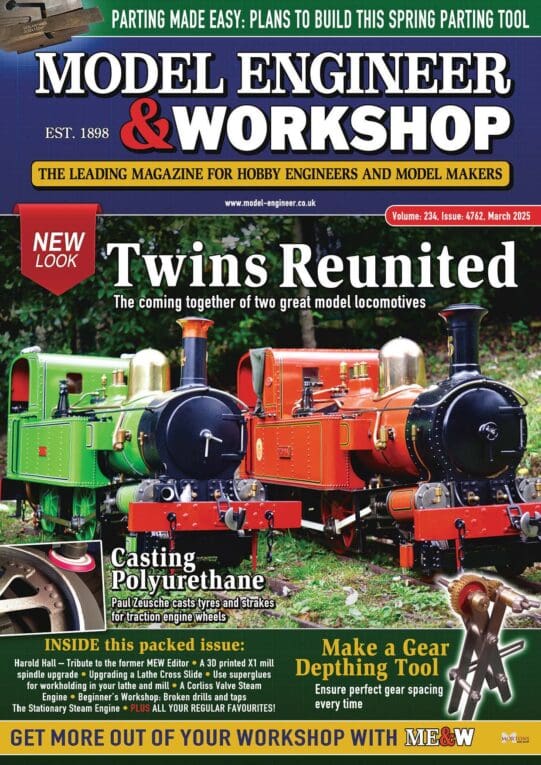On
10 November 2024 at 05:53 jimmy b Said:
UK manufacturing is alive and well!
…
JimB
Ah but Jim, as can be seen in other posts, that fact is not popular here! It doesn’t appeal to a school of thought that believes old ways are the best and that nothing new is good! Perhaps chaps who benefited from Britain’s post-WW2 industrial boom, “you’ve never had it so good”, which peaked during the 1950s before running into deep trouble during the sixties and seventies. May be they conflate the opportunities that fuelled a boom with them having the skills and working methods of yesteryear?
Times and circumstances have changed radically. Seems to me that the big picture forces that drive manufacturing aren’t understood. It’s easier to blame ‘them’ – politicians giving away our inventions, ‘this government’ pushing electricity prices up, ‘Health and Safety’, and ‘computers’ etc. And of course blaming ‘them’ makes it possible to claim that anyone not agreeing with their analysis is ‘anti-patriotic’.
Unfortunately winding the clock back never works. The challenge is how to deliver today, and, even more difficult, how to remain successful in future. Manufacturing has to produce product that customers want and are prepared to pay for. The big problem with traditional methods is that they are slow and costly. They rely on fine materials and expensively acquired skills. Skills that are difficult to retain because the workforce are free to look for higher paid work and better conditions elsewhere. Not good.
Manufacturing for profit requires flexibility, adaptability and a willingness to change. Continually! New products, new methods, automation, vertical integration, horizontal integration, economies of scale, streamlining, out-sourcing, sub-contracting, in-sourcing and any other advantageous form of cost-cutting. When it comes to cost-cutting, a workforce relying on expensive traditional skills is an obvious target. Especially if that workforce is set in its ways, convinced it’s the bees-knees, and determined not to change anything. When the need to cut costs is acute because the firm sells to customers who can get what they want from a cheaper competitor, traditional methods are likely to get the chop.
Not easy for manufacturers to stay on top. Flexibility is vital. They have to get new product to market that people will buy on time. Vic mentions Volkswagen. They are one of many previously successful firms currently struggling with new challenges. In their case, other people making nicer and/or cheaper cars. Having to produce a line of desirable electric cars. And having been caught faking emissions data, a breach of trust that cost a fortune in reparations, Volkswagen now need to raise enormous sums of money from wary investors. Traditional skills don’t figure in their problem at all.
Nothing simple about manufacturing, so beware making simple assumptions about what the problems really are.
Historically, British Industry was notorious for low productivity, and though considerably improved, still an issue. The problem long predates H&S and other modern inconveniences like minimum wage. It’s always cost more to make stuff here than abroad. Why?
I think the answer is multi-faceted, but small-c conservatism was a major factor. Having painfully acquired skills, individuals settle into reasonably paid jobs. The work is comfortable because they know what they’re doing. Too comfortable perhaps? Having painfully learned skills like Imperial measure and Whitworth, along comes some know-nothing office nerd, who wants to metricate. Well he can go spin on it! That a change resistant workforce causes their employer to become uncompetitive isn’t their problem! The accountant’s warnings are irrelevant – pen-pushers know nothing compared with common-sense horny handed practitioners! And of course, being caught by the need for change at work is extremely unpleasant, and often badly mismanaged. I hate change because it means something is broken. Best strategy though is to tackle the consequences head-on, not to ignore them, or to find someone else to blame.
The good news is that although large numbers of British manufacturing firms failed, the survivors are doing at least as well financially as ever. British Industry is a success! Although losing all those old firms and a few million jobs was painful, the awful truth was the despised service sector was subsidising a mass of underperforming industrial firms. Once assets, too many enterprises had become anchors, making the country poorer, not richer. Very sad, but they had to go.
Plenty of books and old newspapers cover what happened. Read ’em rather than jumping to conclusions based on hearay and guessing. Blaming H&S might seem obvious, but it’s not the cause! All too often the problem isn’t “them”, it’s “us”.
Might be completely wrong but I suspect traditionalists wanting to wind the clock back in hope of bolstering British Industry may have led many to vote for a certain major change a few years ago. Ironic, because so far, that move has done more damage to British Industry than anything else this century. A loss in the range -3 to -15% depending on how it’s measured. An example of the Law of Unexpected Consequences!
In a nutshell, I say it’s essential to change when things go wrong. As change is risky what needs doing requires careful consideration. Bu that’s no excuse for bottling out. History suggests reverting to old ways is rarely the answer, whatever wise greybeard says! It’s because old ways failing to cover new circumstances is a common reason for change. By all means celebrate glorious traditions but don’t for one second imagine outdated methods provide an easy answer to what’s needed. Or that what was done in the past was superior.
Dave
 David George 1.
David George 1.




